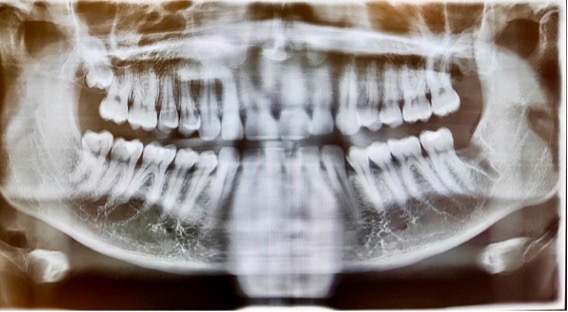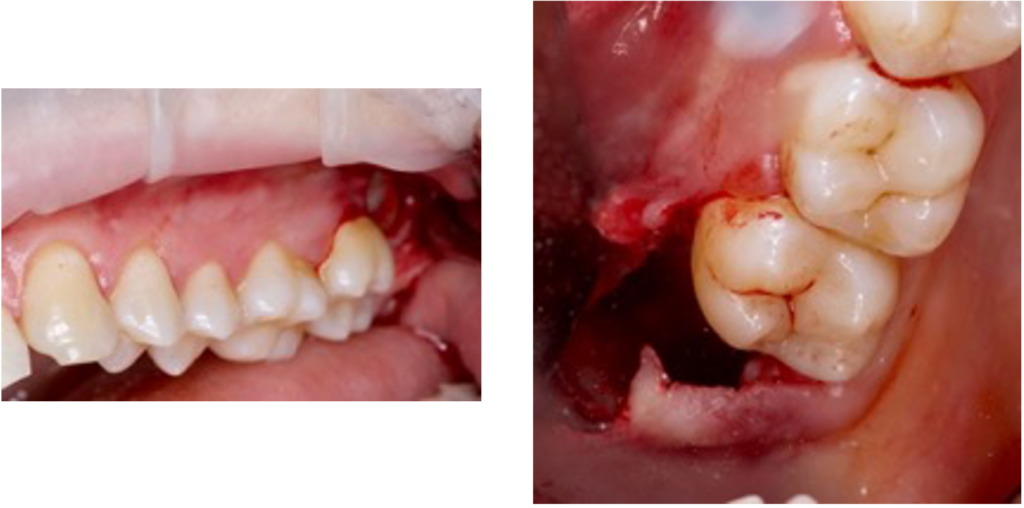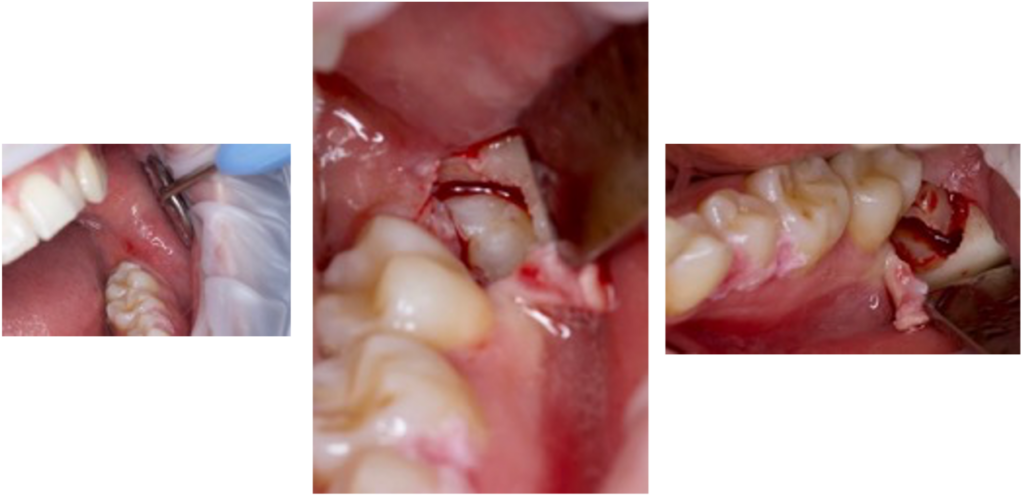Wisdom teeth, impacted teeth, and extraction of lower wisdom teeth, wisdom tooth.
Previous information
Say Goodbye to Wisdom Tooth Pain at Facialia!
Struggling with jaw pain or difficulty opening your mouth while eating? At Facialia, your dental clinic in Silla, Valencia, we specialize in wisdom tooth extractions. These little troublemakers might cause big issues, but don’t worry—we’ve got you covered!
📌 Real Case Study: From Norway to Facialia!
Patient’s Complaint:
A 27-year-old patient came to us with severe jaw pain while eating and swelling extending from her jaw to her eye. 😱 Despite trying medications back in Norway, the discomfort persisted.
Our Assessment:
After a thorough examination, we discovered that impacted wisdom teeth were the root of her pain and swelling. Alongside, we noted early-stage periodontitis. With this in mind, we designed a comprehensive treatment plan to restore her oral health.
🦷 Treatment at Facialia: Bye-Bye Wisdom Teeth!
1️⃣ Comprehensive Diagnosis:
Using advanced radiographs (periapical and panoramic), we identified that her wisdom teeth were pressing against adjacent teeth, causing pain and potential complications.
2️⃣ Personalized Treatment Plan:
We planned a meticulous extraction of the problematic wisdom teeth (3.8 and 2.8), ensuring a safe and efficient procedure tailored to her needs.
3️⃣ Surgical Extraction:
We carefully opened a small flap to access the teeth, removed the surrounding bone, and sectioned the tooth into manageable parts for easy removal. After thoroughly cleaning the socket, we placed fibrin sponges and sutured the area with Vycril 4.0—safeguarding the nearby dental nerve. 😊
4️⃣ Postoperative Care:
The patient left with clear instructions for a smooth and quick recovery. Best of all, she walked out pain-free and smiling!
⭐ Why Choose Facialia for Wisdom Tooth Extractions?
- Surgical Expertise: Our highly skilled professionals ensure safe and effective extractions, even for the most complex cases.
- Holistic Care: We don’t just extract teeth; we ensure the overall health of your gums and oral cavity.
- Personalized Approach: At Facialia, we listen to your needs and provide a tailored treatment experience.
- State-of-the-Art Technology: We use the latest tools and techniques to make your procedure as comfortable as possible.
📍 Visit Facialia in Silla, Valencia
If wisdom tooth pain is keeping you from enjoying life, don’t wait any longer! We’re located in Silla, Valencia, ready to help you regain your comfort and oral health.
👉 Book your appointment today at Facialia.com or call us for more information. Let us help you smile without pain! 😁
O.P.G after extraction 3.8, 2.8

Photos of surgery 2.8

Photo of surgery 3.8

Post-Operative Care and Recommendations at Facialia
At Facialia, our post-operative care instructions are designed to ensure a smooth recovery and long-term success following wisdom tooth extractions. For this case, the patient was given the following guidelines to minimize discomfort, promote healing, and reduce the risk of complications.
🩺 Post-Operative Instructions
- Avoid Sleeping on the Left Side:
To reduce pressure on the surgical site and avoid complications, the patient was advised not to sleep on the left side for two weeks. Studies, such as those by Al-Belasy (2003), emphasize the importance of positional care post-extraction to minimize post-surgical swelling and discomfort. - Soft Diet for Two Weeks:
To protect the surgical area and ensure proper healing, a soft diet rich in nutrients was recommended. Research by Prado et al. (2019) highlights that soft diets after oral surgery reduce mechanical stress on healing tissues and contribute to faster recovery. - No Cheek Pressure or Stitch Exposure:
The patient was advised not to touch the cheek or expose the sutures unnecessarily, as doing so could lead to bacterial contamination or irritation, slowing the healing process. - Use of Chlorhexidine 0.12%:
Chlorhexidine mouth rinse was prescribed for one week, starting 48 hours after surgery, to reduce bacterial load and prevent infection. According to Figuero et al. (2017), chlorhexidine is highly effective in maintaining oral hygiene and reducing post-operative inflammation. - Cold Compress Application:
Ice packs were recommended for the first 24–48 hours to control swelling and minimize discomfort. This aligns with the findings of Laureano et al. (2020), which show that cold therapy reduces post-surgical edema and pain.
💊 Oral Medications
- Paracetamol 500 mg:
The patient was instructed to take paracetamol three times daily for three days to manage post-operative pain. Studies, such as those by Moore et al. (2018), confirm the efficacy of paracetamol for moderate pain relief in dental surgeries. - Vitamin D Supplementation:
Vitamin D was recommended to reduce inflammation and promote bone healing. Research by Bikle (2020) highlights that adequate Vitamin D levels enhance bone remodeling and accelerate recovery after oral surgery. - Antibiotic Prophylaxis:
The patient was placed on prophylactic antibiotics to prevent infection, particularly due to the proximity of the impacted wisdom teeth to the mandibular nerve and sinuses. Evidence from Esposito et al. (2016) suggests that antibiotic prophylaxis significantly reduces post-operative complications in high-risk dental surgeries.
🌟 Evolution and Prognosis
Surgical Outcome:
The extractions were performed without complications. The surgical sites healed well, and the patient reported no significant pain or discomfort during follow-up visits.
Four-Month Check-Up Results:
- Reduced Bleeding and Plaque Levels:
The patient demonstrated notable improvements in oral hygiene, as bleeding and plaque levels decreased significantly. This aligns with findings from a study by van der Weijden et al. (2019), which supports the effectiveness of electric toothbrushes in improving plaque control and gum health. - Improved Brushing Technique:
The patient adopted the use of an electric toothbrush, as recommended, to enhance plaque removal and protect the delicate gum tissues. However, she did not discontinue the use of snus (a form of smokeless tobacco), which may impact long-term periodontal health.
Prognosis:
Despite the continued use of snus, the overall prognosis for the patient was favorable. Continued adherence to proper oral hygiene practices and regular dental check-ups were emphasized to maintain her oral health. Pinto-Filho et al. (2018) noted that reducing tobacco use significantly lowers the risk of future periodontal and oral health issues.
📖 Scientific Support and Recommendations for Future Cases
This case illustrates the importance of:
- Comprehensive Post-Operative Care: Based on guidelines by Pogrel et al. (2017), personalized instructions and early intervention prevent complications and support faster recovery.
- Behavioral Changes: Encouraging patients to adopt healthier habits, such as quitting tobacco, is vital for long-term oral health (Huang et al., 2020).
- Patient Education: Studies emphasize that educating patients on proper oral hygiene practices can lead to sustained improvements in periodontal and general oral health (Tonetti et al., 2018).
At Facialia, we take pride in combining scientific evidence with compassionate care to ensure our patients recover safely and maintain lasting oral health. For wisdom tooth extractions and beyond, Facialia is your trusted partner in dental health.
👉 Book your appointment now at Facialia.com and experience expert care in Silla, Valencia!



